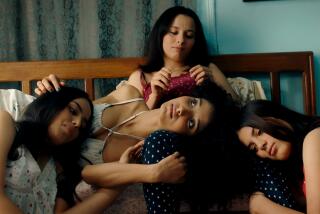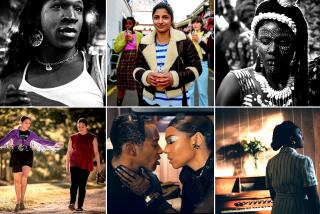Sundance 2015: ‘Wolfpack’ follows 7 kids locked in an apartment, raised on films
Movies at the Sundance Film Festival often arrive with tags of “originality” and “boldness.” But there are few offerings that substantiate the claim like “The Wolfpack,” a documentary about imprisonment, parental abuse and the power of classic films to redeem them both.
Crystal Moselle’s debut feature, which will premiere Sunday night at the independent-film gathering, tells of the real-life Angulo family, a set of six brothers and one younger sister growing up in a low-income development on New York’s Lower East Side. To call them a family is technically accurate, but it doesn’t begin to hint at their unusual circumstances. Sundance has seen some dysfunctional groups on its screens over the years. It may have never seen one like this.
FULL COVERAGE: Sundance Film Festival
The product of a white Midwestern mother and Latino father, the children live in virtual isolation above one of the world’s biggest cities. Their father, a convert to Hare Krishna, hopes to avoid the “contamination” of the streets below and keeps the children, who are home-schooled, strictly behind apartment doors.
“I always metaphorically describe our childhood as him being the landowner and us the people who work on the land,” one of the children says in the film. “But if you want a more dramatic setting, we were in a prison and at night our cells would lock up.”
In response to these conditions, the boys (their names are Bhagavan, Govinda, Mukunda, Narayana, Krisna and Jagadesh, though with many close in age and hairstyle, it can at times be hard to distinguish them) have turned to movies. Many, many movies. Though the Internet and other media appear to be forbidden, films aren’t, and the children — over the course of the film they range from pre-adolescent to their early 20s — consume films in bunches.
That would be unusual enough. Only the boys set out not only to view the films but to reenact them, and with an eerie attention to detail. “Pulp Fiction,” “Nightmare on Elm Street” and other modern hits are often staged and filmed, as are older classics. Costumes are donned, lines are recited. Entire movies are transcribed--not just the dialogue, but the gestures and the background details--so that the movies are staged with accuracy.
So faithful to the original do the brothers seek to be that it isn’t ununcommon to hear one of them refer to their activities with phrases such as “I played that” character, the way Alec Guiness might refer to playing Macbeth.
As the boys slowly emerge into the world over the course of the movie, their lives begin to take a different shape, and the collision between their reality and an actual reality produces some intriguing consequences. The movies they’ve watched color their perception of the world and influence their speech. Moselle said that in editing the film she sought to eliminate some of the movie references so the dialogue felt more natural--”but it was hard to do because they’re almost all references.” “The Wolfpack” may be the first time in history that the beaches of Coney Island elicit a comparison to “Lawrence of Arabia.”
In the run-up to the festival, organizers have been touting the film and its inherent absurdism. Discussing the slate last month, programming director Trevor Groth was told, half-jokingly, that the film could play like a cross between “Stand by Me” and “Super 8.” He responded: “That’s not as far off as you think.”
A graduate of New York’s School of Visual Arts, Moselle, 34, came across the children in a downtown park as they were just starting to emerge into the world (they were tricked out in suits and shades from “Reservoir Dogs”). She befriended them and eventually spent nearly five years at their apartment filming them; there is also a large amount of archival footage.
“I felt like I was discovering a long-lost tribe in the Amazon,” she said in an interview. “There was a lot of awkwardness — I remember even having to explain to them what ‘small talk’ was, because they had no idea. But they were also really hungry for human interaction, and that was beautiful to watch.”
Moselle said she sought to maintain her objectivity but at times did seek to help them understand more about the outside world. (Friends and family, at first concerned with how embedded she had become, soon came to know and like the boys.)
She also became close with their mother. A sweet-natured woman caught in the cross-currents of a controlling husband and increasingly self-aware children, the mom is perhaps the film’s most heartbreaking character.
The boys trade in a kind of private language and even a certain form of exuberance, all of which can evoke “Capturing the Friedmans,” another movie about an insular family and possible parental malfeasance. Fictional fish-out-of-water tales as diverse as the “Tarzan” films and the 1999 Christopher Walken comedy “Blast From the Past” also come to mind.
But for all the references (which the Angulo boys would no doubt appreciate), the gestalt of “The Wolfpack” is like few films in recent memory. With its mythic qualities, the movie, which is seeking distribution at Sundance, can almost come across like a fable.
It is also can feel like a sociological experiment.
“I feel like there are so many larger repercussions — about raising children, about isolation,” Moselle said. “When someone is glued to Facebook all day, or to their computer, that’s a form of isolation too.”
The boys are set to come to Sundance, though as they prepared to depart New York, at least one inquired about the rules of flying on a plane. Moments like that echo some of the film’s most telling and poignant scenes, such as when the boys sees the woods for the first time.
“This is just like 3-D,” one says.
Replies his brother: “I feel like I’m in the Fangorn Forest in ‘Lord of the Rings.”
More to Read
Only good movies
Get the Indie Focus newsletter, Mark Olsen's weekly guide to the world of cinema.
You may occasionally receive promotional content from the Los Angeles Times.







